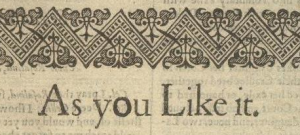Close readers of the plays of Shakespeare will have noted that characters will often address others using either you or thou. The employment and differentiation of you and thou are still in use in French, Italian, and Spanish. The words in translation are also used in the speaking of German.
 Examples of You vs Thou in Plays of Shakespeare
Examples of You vs Thou in Plays of Shakespeare
Further, individuals will often alternate between using these terms.
Lady Capulet in “Romeo and Juliet” does this. Lady Capulet may be revealing her unsettled nature about Juliet’s status as one who is ready to get married or one who is still a child.
The shift from you to thou is also prevalent in “As You Like It,” which the Classical Studio has just produced.
In the opening scene, the character of Oliver begins by addressing Orlando as you. Then quickly employs the more insulting thou as Orlando attacks Oliver.
Later, Celia uses the more familiar thou (often used among equals). On the other hand, Rosalind keeps herself apart from Celia by using the more formal you.
It will be up to the speaker of the text to determine what clues are being given in the text. He should also give thought to how the speaker is departing from what is considered to be the norm.
The use of you indicates a polite form of address and thou indicates an informal or familiar form of address.
In the Plays of Shakespeare – Insult or respect?
One would use you in addressing someone who is of a higher social status than oneself, a parent, or someone whom you would like to keep away from yourself.
Also, if one person is using thou and another is using is using you, you might find yourself in a situation where the user of you is clearly not just into the one using thou.
In addition, one would use thou when addressing a servant or an intimate friend or colleague.
Thou could also be used to hurl an insult to one who has caused displeasure. An example of this is the case with Oliver and Orlando cited above.
In conclusion, in the plays of Shakespeare the use of you and thou can lead to a greater understanding of the speaker’s intentions.
Also, they present the actor with a wider range of possibilities in interpreting the text of a given play.

For more help with the plays of Shakespeare download your copy of the Audio Shakespeare Pronunciation App.
Available for download on iPhone or Android.



